John Janaro's Blog, page 125
April 30, 2020
Are We "Tired of Being Stuck in the House?"
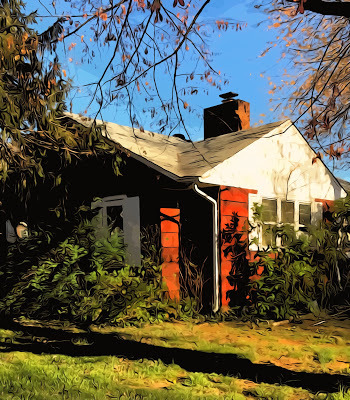 Dear dear people. I know, this is not easy. I'm an old hand at this lifestyle.
Dear dear people. I know, this is not easy. I'm an old hand at this lifestyle.In many ways the pandemic that has brought the entire planet to a screeching halt — forcing everyone to stay at home, suspending much face-to-face interaction with others, and limiting people's ability to go places — has thus far had little impact on what has been my daily routine for more than a decade.
In a sense, I feel like saying, "Hey everybody, welcome to my world!"
Certainly, I have had ups and downs in recent years. There were periods of time when I had more (even daily) direct interaction outside the house (especially the years when I had an "office" at my wife's school), and I usually have opportunities to "go out" once in a while, or at least every Sunday. But staying-at-home has been a major feature of my life since my own persistent (non-contagious but debilitating) illness led to my quite premature "retirement" from active teaching in 2008. So when we were all told to stay-at-home in March, for me it was just like, "okay, sure." Many people's worlds have been turned upside down by just the quarantine itself, whereas I'm used to being at home.
On the other hand, some of this has been new for me too, obviously.
I never really noticed how "reassuring" it was that — even while I was staying/stuck-at-home — the rest of the world was humming along more or less the same as ever. Sometimes I struggled with feelings of envy toward all of you busy, energetic people, especially after I became a bit healthier and more stable after a few years but still had long-standing issues that precluded any possibility of returning to "normal" life. Nevertheless, the bustle of the Global Village remained an enveloping environment that I was accustomed to living in, even if my own activity was reigned in at a necessarily slower pace and constrained by unusual limits. The kids grew up over this decade, while Eileen taught at a growing and thriving Montessori school. I was able to participate in some of these events, like high school graduations (and our first college graduation), attending some sports events, school plays, etc. Above all, I was always reliably at home — not that I was able to run the household, but I did in a sense "anchor it."
Meanwhile, lots of stuff was happening in the bigger world. While I could have easily spent ten years buried in my hard-copy books and carrying on what was always a wide and extensive written correspondence, the growth of new communications technology generated new ways to engage with current events and people "in real time," which I could do even when I was laid up in bed. While well aware of the ambivalence of the new media, I think at least some sick and homebound people would agree with me in tending to regard all this virtual accessibility as "a glass half full." It uses up a lot of energy, nevertheless, which means I can only take so much of it before it poops me out. I still have plenty of time (and need) for no-tech old fashioned books, research, and just... thinking.
So what has changed for me in these past two world-shattering months? Nothing? On the contrary!
This whole experience is above all tragic for all those suffering because of the COVID-19 event, whether it's from the devastating effects of the sickness itself or from other consequences that are affecting people (economic, social, cultural, etc. which are still unfolding) as a result of the need to slam the brakes on the entire world. I am immensely sorry for all these people. They and their families and their incredibly overstretched medical caregivers are in my heart and my prayers. I salute all of our heroes: medical workers who are fighting so hard as well as the great variety of other essential workers. This time has been an awakening to gratitude for how much we really depend on all of you to keep the connections going for our radically interconnected and interdependent ways of accessing and obtaining even the most basic things that we are accustomed to having in our lives.
But the impact on me of these days is more than just a matter of empathy and gratitude. A public health emergency is a dreadfully serious thing in any circumstances, and there has never been anything like this in my lifetime. It is, moreover, of particular concern for someone like me who is already immuno-compromised and therefore in the "high risk" category for developing the more dangerous complications from the COVID-19 infection. I would probably not fare well in a personal battle with this virus. Therefore, it will continue to be necessary for me to "stay safe" in the strictest sense long after the gradual phases of "opening up" have begun.
I don't know what that will entail for me once the rest of the family is back in public circulation, but here in Virginia that process is still weeks away. We'll assess it when the time comes and I'll try to proceed in a prudent and reasonable way, which may end up being weird and scary anyway (but what else can I do?) — we can only hope and pray that a responsible opening up process will work.
Meanwhile, sharing my home-bound status with the rest of humanity for the past two months has been strange, even bizarre, and often worrying, while also being surprisingly "nice" in some ways, and — for a student of media and culture like me — quite "interesting" (which is different from saying it's "good" or "bad," much less that I feel comfortable living through it and facing its possible implications).
It has been very strange, that the streets of the cities of the world are empty, and that everybody else is not bopping around through their regular routines even as I remain stationary. Suddenly, it's gone BANG for everybody, that total life-shift, like you've been transported to another planet and you're trying to get back to your "normal lives" or wondering what that even means. I know how this feels. I went through all of this. I wrote about it in my book ten years ago [check out the book, Never Give Up: My Life and God's Mercy (Servant, 2010) which is still in print and on Kindle]. After two months of the "post-pandemic" world, people might find that they relate to my book in new ways.
Of course, the big difference is that I was very sick. Most of you have been home-sitting and you feel fine. I think in some respects it must be easier to be stuck in a place when one is literally stuck — whereas if you are raring to go, physically and psychologically, but there's no place to go, it adds a different kind of frustration into the mix. In any case, it takes a long time to adjust to such a sudden drastic... change! Don't be hard on yourselves if you've been out of sorts during these weeks.
There is another difference, at least for many of you: right now you are counting on all of this being temporary. This is a weird phase of your otherwise normal life. Soon it will be over and you'll be back to work, school, or wherever you want to be. It may not be quite so easy — not as easy as everyone hopes it will be — but you have expectations for a different kind of future than being stuck in the house.
Most of you will be out of quarantine pretty soon. You won't be stuck in the house anymore. What will happen next is harder to predict. I really don't know. Your lives and mine might well be in for further upheavals and instability. There is much palpable uncertainty, and though we'd understandably rather not think about that, it may be overwhelming for some people.
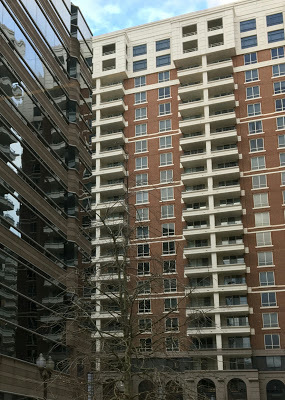 Perhaps you have already lost your job, or maybe you will in the future. I have been through that, and I know it's terribly hard. It's hard to remember that you really are worth immeasurably more than anything you make or do, any social role, honors, or riches.
Perhaps you have already lost your job, or maybe you will in the future. I have been through that, and I know it's terribly hard. It's hard to remember that you really are worth immeasurably more than anything you make or do, any social role, honors, or riches.Of course, we need basic provisions for living. Ordinarily these should come in relation to the fruits of our work (though often we don't get enough to meet our needs in this world of tragedy and greed, injustice and inequity). Moreover, work accords with and expresses our dignity, and we grow through work. We also grow through endurance and suffering in circumstances beyond our control. Unemployment is a very profound source of human suffering. But no matter how hard it gets, please don't give up on life. Don't lose yourself.
I did say earlier that some good has come out of our recent confinement.
Right now, one of the positive things about my being-at-home is that Eileen and my four daughters are here too. (John Paul has his own place, where Emily will join him in August after they get married.) In recent years, I have grown used to the people of our household coming in and out and being very busy. Though everybody is still pretty busy (school goes on via gadgetry) and it has been some strain on the girls, we have also had some good family time. A lot of people have remarked about this part of the experience being something positive, and I hope we can remember the value of it (and the strength of it) as circumstances move on.
My Catholic friends have had a hard time adjusting to the video Mass and making "spiritual communions." I had already learned to appreciate the value of such possibilities as options for weekdays and special celebrations. But one thing I have always done through the years is go out to the real live Sunday Mass. I feel the absence of those outings (and there were times in the past when Sunday Mass was the only outing of my week). I miss being in church; I miss the nourishing foundation of the whole of life which is the Sunday Mass. Sundays are precious, and the Mass and the Eucharist are gifts of immeasurable value.
But we are doing what we can in faith and charity. Meanwhile the clergy have made tremendous efforts to give whatever measure of accessibility is possible under the circumstances, and there have been many creative initiatives of prayer and mutual support on the "digital continent." Of course, we always have the Scriptures, the Rosary, the liturgical texts, our brothers and sisters the saints, the treasury of spiritual wisdom to ponder, and the concreteness of so many signs of our connection with Jesus in the sacramentals (blessed objects), the crucifix, icons and images. There has been much to engage us during Lent and Easter. The Lord is working within these unusual limits, perhaps also helping us to be more aware of the profound solidarity we share in Christ's "mystical body" and opening us up to what Pope Francis referred to as "the creativity of love" that finds ways through hardships to stand together in Christ and reach other people through paths of witness they we might not otherwise have traveled.
To all my dear people, here we are at the end of April. I don't know how things will unfold, how hard it will be, how long we'll be stuck in the house (or in some places we never imagined we'd be), how COVID-19 may change or have further impact on us, or whether we'll have a depression or a war, or perhaps a lovely Summer. What I know is that God is good, and He loves us — He leads us on mysterious ways to a destiny that is beyond our understanding but that also corresponds to the cry of our hearts, to our longing for happiness. We want happiness because we were made for it.
In my life, and in all the strangeness of the past two months, and in all the uncertainty of the future, I am still convinced that God is always good. I also know that its not always easy to see the signs of His providence and His tremendous care for each one of us, but that He will enable us to keep going, to persevere, to walk step by step even in the dark. Whatever we are called to endure, we will find the love of God "within" those circumstances. I'm a wreck of a human being and I'm not "good at" any of this spirituality stuff, but His love is there and that is what matters. We may be scared, we may be angry, we may scream at the walls in frustration and agony, but let's keep praying, begging, searching, crying out to God — never giving up.
Published on April 30, 2020 19:11
April 29, 2020
Catherine: "Leave the Measuring Up To Him"
 Some words from a wise woman of the 14th Century:
Some words from a wise woman of the 14th Century:"I can do anything through Christ crucified, for I know truly that he does not lay a heavier load on his creatures than they can bear.
"So I want to leave the measuring up to him and, for my part, bear these things with true patience... I know that whatever God grants or permits, he does it for my good, so that I may be made holy in him" (Saint Catherine of Siena, 1347-1390).
Published on April 29, 2020 20:17
April 27, 2020
Happy at the Creek
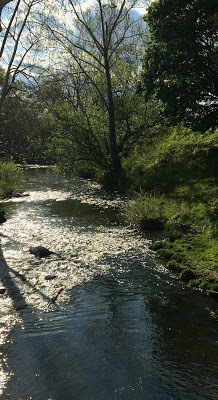 When the sun came out in the afternoon, I went to one of my favorite spots on "Happy Creek." It's only a short walk from home, but for me it's an "outing" to come here.
When the sun came out in the afternoon, I went to one of my favorite spots on "Happy Creek." It's only a short walk from home, but for me it's an "outing" to come here. I always loved the water: oceans, lakes, rivers, boats and fishing...
Long ago I learned that life is a beautiful gift, and that "restrictions on movement" don't have to diminish the joy of being a person or the sense of gratitude for the wonder of existing.
In the years since my illness, I have not been able to do many of the things I loved to do on the water, and I'm rarely able to travel. It's not easy: I long for the ocean; I miss my boat; I remember the excitement of exploration, taking risks, going further out than others, finding amazing new vistas, having many adventures... I miss all that, sometimes. But I still have adventures! I have my "happy" creek full of wonders, and I see its bright jewels and hear its secret whispers in new ways.
Published on April 27, 2020 20:07
April 25, 2020
Saint Mark's "Origin Story"?
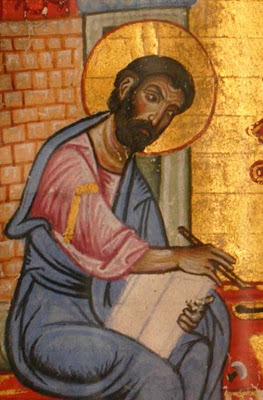 Saint Mark the Evangelist, whose feast day is April 25, is venerated as the inspired author of the Gospel that bears his name, which depends largely on the witness of Saint Peter, whom Mark served in Rome during the Apostolic era. Mark is also traditionally honored as the founder of the church in the great ancient city of Alexandria in Egypt. Also widely held is the story of his martyrdom in that city by being dragged through the streets by a rope around his neck.
Saint Mark the Evangelist, whose feast day is April 25, is venerated as the inspired author of the Gospel that bears his name, which depends largely on the witness of Saint Peter, whom Mark served in Rome during the Apostolic era. Mark is also traditionally honored as the founder of the church in the great ancient city of Alexandria in Egypt. Also widely held is the story of his martyrdom in that city by being dragged through the streets by a rope around his neck.But where did Mark come from? Did he ever see or even meet Jesus? How did he become a disciple?
To these various questions the New Testament gives a few references, suggestions, and somewhat oblique hints. Then there is one significant Gospel story regarding a person who is never identified, but who certainly invites our curiosity. While his identity can never be proven, there are a few hints that render it plausible that it could have been Mark.
I like this idea, not so much from a scholarly point of view, but rather from the feeling of wouldn't-it-be-cool-if-this-were-true? - which obviously carries no exegetical weight beyond its mere possibility, a few hints of its plausibility, and the "fittingness" it would give to this story (recounted in all three Synoptics) of a dramatic encounter with Jesus during his earthly ministry.
It has occasionally been speculated that the "rich young man" who came to Jesus and asked what he had to do to "inherit eternal life" was in fact none other than the young Mark. As we recall, he affirmed his fidelity to the commandments, but when Jesus told him to sell all his possessions, give to the poor, and then "come, follow me," the young man "went away sad, for he had many possessions" (Mark 10:17-22; Matthew 19:20 specifies that he was "young").
We all know the story. But why connect it with Mark? This requires further speculation regarding this mysterious vocational encounter between Jesus and the rich young man, and also some connecting of dots that are perhaps a little more suggestive.
We are told that the man "went away sad," but we are not told where he went, what he did thereafter, or even what he decided to do with his possessions. Mark's Gospel recounts the story of the event during Jesus's time in Judea going up to Jerusalem (see Mark 10:1, 32). We know that Jesus had a few good connections in Jerusalem. There was at least one family with a house that included servants and an "upper room" that was large enough for a Passover meal for (at minimum) 13 people. Jesus was on familiar terms with the residents, enough so that he could arrange for his disciples to rendezvous with them and request the "large" "furnished" room on behalf of "the Teacher" (see e.g. Mark 14:13-16).
While this hardly indicates a palace, we are talking about a multi-story house of the kind that would belong to people of substantial means. This house will turn out to be (apparently, for no other houses are mentioned) the central piece of real estate in Jerusalem for the disciples beginning with the Last Supper, through the Passion and Resurrection, Pentecost, and the early life of the Jerusalem church. The book of Acts refers to a prominent house in Jerusalem where Peter went after being freed from prison, "the house of Mary, the mother of John whose other name was Mark" (Acts 12:12). Christian traditions and the archeology of ancient churches in Jerusalem identify this house in Acts 12 with the house of the prior events. It has been the location since Roman times of the building, destruction, and rebuilding of the "Church of the Cenacle" (in honor of the Last Supper).
Acts12:12 is the first time we hear the name of the one generally agreed to be the author of the Gospel of Mark. He is the son in the family that owned the house where some of the greatest events of the Gospel and the foundation of the Church occurred: the Last Supper, the Resurrection appearances, the outpouring of the Holy Spirit. Mark never refers to himself by name in his gospel, but he is the only evangelist to tell us about the "young man" in the Garden when Jesus was arrested, who "ran away naked" (Mark 14:51-52). This is an unusual detail to include in a Gospel generally sparing in details. It has long been posited that Mark was referring to himself, and this becomes more plausible if we identify the wealthy home where the Last Supper had taken place with the home of Mark's wealthy family. The supposition is that young Mark secretly followed Jesus and the disciples to Gethsemane that Holy Thursday night, only to find himself stripped of his nightcloth while fleeing the unexpected scene of betrayal and arrest.
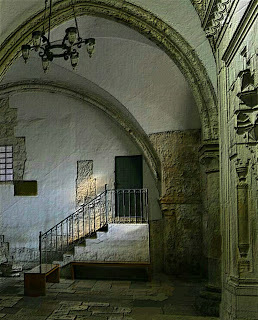 What we might draw from all of these clues is a sketch of "Mark" as a "rich young man who was fascinated by Jesus" but not yet ready to commit to being one of his followers.
What we might draw from all of these clues is a sketch of "Mark" as a "rich young man who was fascinated by Jesus" but not yet ready to commit to being one of his followers.It's not much of a sketch. I certainly haven't come close to proving anything (and I qualified from the beginning that I wasn't going to prove anything). But at this point, I haven't even pointed to any evidence that might connect the rich inquirer of Mark 10 with the frightened (and chilly) young man running from the garden in Mark 14 - even if we presume that the latter was the Evangelist himself who was at that time heir to the property destined to be known as "the Cenacle." Why is it worthwhile to even consider this as a possibility that would be pretty cool if it turned out to be true?
Well, there is one more thing. The story of the unnamed rich young man whom Jesus calls to "follow him" is recounted in basically the same way in all three Synoptics. Once again, however, Mark introduces a detail not found in the other two accounts. It might be easy to miss, but it's important for its own sake. Mark tells us that after the rich man declared his obedience to the commandments but before Jesus spoke the great invitation, there was a moment where "Jesus, looking upon him, loved him" (Mark 10:21).
"Jesus, looking upon him, loved him..."
At the very center of this dramatic, profoundly personal, inscrutable meeting between two persons - the rich young person who was full of goodness (he kept the commandments) yet was searching for the definitive fulfillment of eternal life and Jesus who is that fulfillment in Person - it is Mark (and no one else) who gives us a glimpse "from within," from the silence of an intersubjective experience, of someone being loved by Jesus.
Why is Mark the one who bears witness to this love, which is the very core of the encounter? Could it be, possibly, that he was the one who experienced it?
When Jesus "looks upon you" and "loves you," it changes your life.
The Twelve left everything and followed Jesus when he called them. Later on, things got complicated: one betrayed him, another denied him, and they all fled. They ended up hiding in Mark's house, terrified and incredulous even when Jesus first appeared to them as the Risen One.
It's not impossible that others among the earliest group of disciples had different experiences that were sloppy in other ways. Maybe when they first experienced being loved by Jesus and called to follow him, they had a crisis. "What am I going to do?" "What about my mother and father, my children?" "What about all my possessions, my responsibilities, the people I employ, the people I work for? How am I going to disentangle all those knots and follow you? Still, I know that you are more important than anything in this world; I have never been so known and so loved before. I'm overwhelmed!"
Maybe those people "went away sad" ... at first. But something new had happened to them. Maybe some of them didn't go very far. Maybe they bumbled around on the edges of the crowd, conflicted and afraid but also more and more convinced, still hesitating, worrying, but drawn on by the love that finally won them over.
Jesus has no patience with "hesitation" pretending to be a legitimate pretext to put off following him, but he has immeasurable patience with human persons who are plagued by all sorts of obstacles and hesitations and smallness of faith. This is clear in the Gospels and it continues to be clear in the history of the Church.
The rich young man goes away sad because he has many possessions. Maybe the sadness, the possessions, the ego, the preoccupations assert themselves by force of habit at first, but how they shrink into insignificance in light of the unforgettable experience of being loved by the One who created him, the One whom he seeks, the One who took upon himself human nature and human flesh, a human heart, human eyes so as to "look upon him" and "love him" and want to be his friend.
"What can I do? ...Well, perhaps when they come to Jerusalem, they can use the house," the rich man thinks. And he becomes a little less sad. The seed has been planted...
Now I'm just making up an inner monologue that doesn't appear in any Gospel narrative. Clearly what I am setting forth are no more than musings, though perhaps they are edifying musings. I might be permitted some "poetic license" in imagining what might fill the gaps of a scenario that is only remotely plausible? As long as I'm not trying to fool anybody.
Still it is plausible. I would like to know, in particular, why Mark gave us that magnificent detail in his Gospel account of the rich young man: "Jesus, looking upon him, loved him..."
If Mark had experienced that moment himself, personally, he would have remembered it. And he would have wanted us to remember it too.
Published on April 25, 2020 18:21
April 24, 2020
The Lord Permits Evil Only to Bring Forth Greater Good
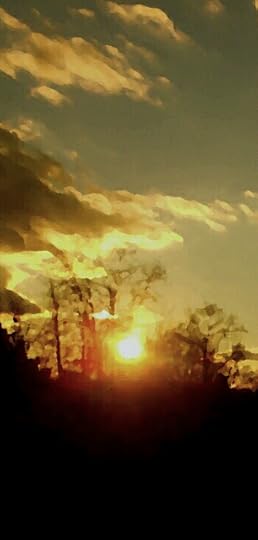 We're all at least a little worried these days...
We're all at least a little worried these days...But if we could penetrate the fullness of the mystery of our lives, we would see that everything really is "grace," that God is indeed good, all the time.
Everything in our lives unfolds according to our Father's loving plan for each one of us. If God allows something bad to happen to us, He permits it because He wants to bring a greater good out of it; He wants to lead us through these struggles to a deeper and more mature life.
In affirming this, we don't want to trivialize in any way the terrible, catastrophic events our world is passing through right now - the COVID-19 pandemic and all its direct and indirect consequences - nor any other of the tremendous pains and apparently inexplicable sufferings that people face in different times and ways in their lives.
Rather, we need to recognize that the ultimate purpose of every human life is a transcendent greatness and fulfillment that are hidden in the mystery of God's goodness.
And He is good. He loves us. When He permits us to suffer, He also gives us the strength to endure and grow through it.
God our Father loves us immensely, tenderly, far greater than we imagine, and like a true father he protects us from so many dangerous and destructive things that threaten our existence in ways we may never even know about. But He doesn't always shield us completely from things that make us suffer. He wants us to grow. Even though our ultimate happiness is His gift, He wants us to receive it in a mature way, by giving us a participation in the victory He has won for us over all His (and our) enemies.
Thus, while He may permit evil things to happen to us, He always gives us what we really need to triumph over them, ultimately. That includes the grace that enables us to ask Him for help, to recognize that we need Him and are totally dependent on Him.
We don't ultimately know ourselves, or the mystery of the whole person God wills each of us to become. He calls us to be His children, heirs to His kingdom who are destined to be like Him, to see Him as He is, to share in His everlasting glory. When bad things happen in this life on earth, God doesn't usually show us (at least, not at the time) the entire purpose of these events in our journey to our destiny. He promises us they they will bear abundant fruit, but we don't really understand (beyond the "darkness" of faith) what that transfigured fruition entails.
We have to trust Him.
Trust is a decision; it is a position of the heart in the midst of the storm. It does not depend on how we feel, and it may not make us feel any better. It usually doesn't make the bad circumstance disappear. But trust makes our hearts grow. We must trust God and never give up, even if we feel like we can only do it through gritted teeth.
Above all, we trust God because He has sent His Son into the world to accompany us on the whole way of our journey in this life, through every joy and every sorrow, to the depths of our lives and all the way to the end: Jesus Christ. We must hold onto Him. He will not leave us. He has come to stay with us.
He stays with us through all the storms of life: whether they be pandemics, unemployment, poverty, strange times with all the anxieties they bring, any physical or mental illness, loss of loved ones, pain, confusion, and - above all - the chaos we unleash upon ourselves by our own sins.
He wants to stay with us, and therefore He has taken hold of us all the way through. Even when our boat is sinking on the journey, even when the storms of life are a great deluge, even when we're soaked so much we can't remember what it's like to be dry and on solid ground, even when we're submerged beneath the churning waves, when we don't know up from down, right from left, when everything is underwater - even then, He is still holding on to us!
Trust in Jesus, and never give up.
Published on April 24, 2020 20:07
April 21, 2020
The Whole Jesus
Jesus risen from the dead: “Here is something far out of the ordinary. The Lord is transformed. His life is different from what it was, his existence incomprehensible. It has a new power that comes straight from the divine, to which it constantly returns for replenishment. Yet it is corporal; the whole Jesus is contained in it, his essence and his character. More: his earthly life, passion and death are incorporated into it, as the wounds show. Nothing is sloughed off; nothing left behind as unessential. Everything is tangible, though transformed, reality.”
~Romano Guardini, The Lord 6:2
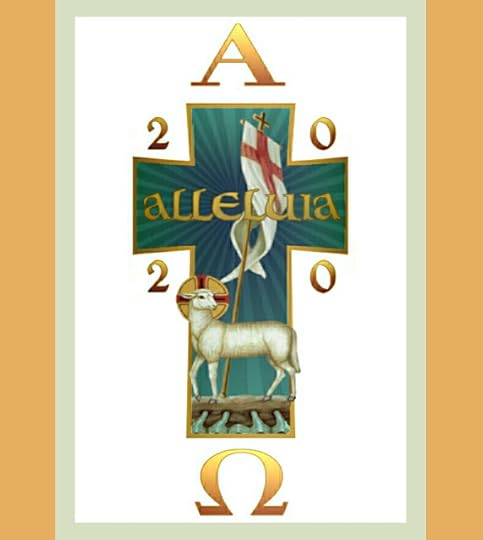
~Romano Guardini, The Lord 6:2

Published on April 21, 2020 15:12
April 20, 2020
Epicenters and Aftershocks of the COVID Earthquake
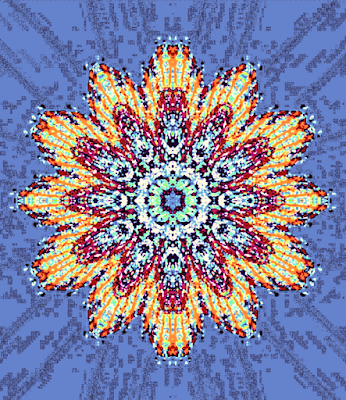 Nearly four months into 2020, the world is still shaking from the coronavirus. It really is shaking, and even if many of us who are sheltering-in-place can't feel it, we still need to stay where we are, for now. That's not always easy or immediately evident, given our diverse particular situations.
Nearly four months into 2020, the world is still shaking from the coronavirus. It really is shaking, and even if many of us who are sheltering-in-place can't feel it, we still need to stay where we are, for now. That's not always easy or immediately evident, given our diverse particular situations.For Christians it's the Easter Season. I trust in the resurrection of Jesus, the light who strengthens me and gives me confidence in God's goodness. Jesus guarantees the ultimate value of all our efforts to do good in this world. But he doesn't provide packaged solutions to complex human problems. Rather he calls us from within those problems to grow in new life by living intensely our humanity in its present needs and with our particular gifts. I'm a thinker and writer, so I here I'm sharing my perspective.
We are all enduring a public health emergency that is obviously serious but can also seem a little "remote" from the experience of many of us. Unless we are sick with coronavirus or have loved ones who are sick or are medical professionals and health workers caring for these sick people, we don't directly encounter the terror and suffering of this disease. Still, we are all affected by its proximity. We have heard testimonies — some awful and heartbreaking, others courageous — we have seen pictures and videos, read articles with statistics, numbers, and curves.
We understand that the "chances are low" for most people to become seriously ill. We know — statistically, as individuals in "low risk" categories and in good health (I speak not for myself here, but for a broad group of people, for most of the people I know personally) — that we will "probably" be fine, but that there is also a real danger from this virus for each one of us. We need to take proper precautions, and part of the craziness of life right now is the somewhat uneasy awareness that (however “remote” the chances may be for us) we might still get sick and even develop further complications. We can't live in excessive fear, but we do need to give special attention to the matter and use particular procedures to protect ourselves from the virus as best as we can.
Most of us have been doing all of this for the past couple of months (more or less — hopefully more rather than less). Maybe we've been eating too much junk food and watching too many videos, but otherwise we feel "fine," and Spring is here. We're sick of Zoom and FaceTime and we want to get out and be with people and hug them, and get back to larger groups and public gatherings again. We're getting more antsy and jittery and are running out of patience. We want this to be over — but we can't let our restlessness prevail over our responsibilities as members of a society in which this problem is far from over. In fact, we have before us a difficult path with bumps and twists, and we are basically drawing the map as we go.
So where are we going? We know that scientists are working hard to find treatments (we've also heard about a few nutty conspiracy theories and quack remedies). Meanwhile, economic hardship is already hitting some people hard (and we care a great deal about this suffering too). Moreover, beyond all the theories and dire warnings, it's beginning to look like the economy is falling down all around us. We are nervous. Rumors abound, driven by the latest tweet. It may not be helpful to us to turn to the media or the Internet every day hoping that The Solution will appear. Real life never works that way, so let's not jump at oversimplifications out of the need to "feel secure." Let's not be suckers. This is an exercise in human patience and perseverance. We have to stick with it.
Everybody knows this. We have been admonished by all the celebrities on television or social media — as they chill out in their gazillion-dollar mansions (
Published on April 20, 2020 20:35
April 19, 2020
Divine Mercy Sunday
HAPPY DIVINE MERCY SUNDAY! "O blood and water, which flowed out from the heart of Jesus as a fountain of Mercy for us, I trust in you!"
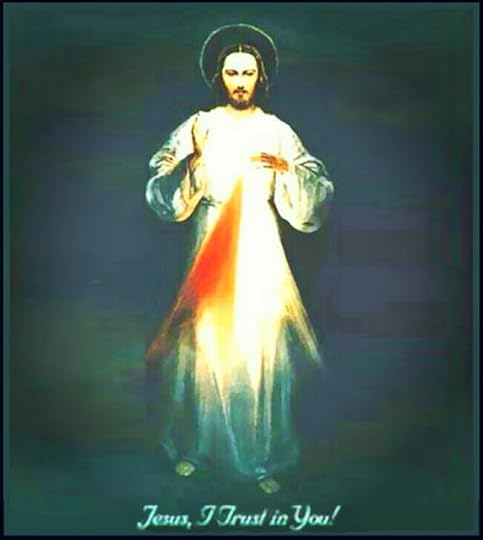

Published on April 19, 2020 20:31
April 16, 2020
The Easter Encounter
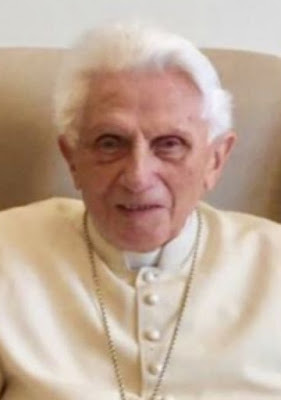 "What was from the beginning, what we have heard, what we have seen with our eyes, what we looked upon and touched with our hands concerns the Word of life. For the life was made visible; we have seen it and testify to it and proclaim to you the eternal life that was with the Father and was made visible to us. What we have seen and heard we proclaim now to you, so that you too may have fellowship with us; for our fellowship is with the Father and with his Son, Jesus Christ" (1 John 1:1-3).
"What was from the beginning, what we have heard, what we have seen with our eyes, what we looked upon and touched with our hands concerns the Word of life. For the life was made visible; we have seen it and testify to it and proclaim to you the eternal life that was with the Father and was made visible to us. What we have seen and heard we proclaim now to you, so that you too may have fellowship with us; for our fellowship is with the Father and with his Son, Jesus Christ" (1 John 1:1-3).The vivid letters of Saint John express the incarnate reality of the resurrected Jesus we celebrate this work.
This day also marks the 93rd birthday of the monk at Mater Ecclesiae monastery in the Vatican. For seven years he has resided there in retirement, a contemplative with frail but stable health. Before that, he was the bishop of Rome, the Servant of the Servants of God, Benedict the XVIth Pope of that name.
The resignation of the now-Emeritus Pope was an unusual and dramatic event, though by now we have grown accustomed to it. What we must not forget, however, are the eight years of outstanding teaching and preaching he carried out as the Successor of Saint Peter, a legacy from which we have much to learn.
Pope Benedict was (and remains) a powerful witness to the reality of the risen Lord. Here are some of his words from Easter Sunday on April 5, 2012:
"Every Christian relives the experience of Mary Magdalene. It involves an encounter which changes our lives: the encounter with a unique Man who lets us experience all God’s goodness and truth, who frees us from evil not in a superficial and fleeting way, but sets us free radically, heals us completely and restores our dignity.... 'Christ my hope' means that all my yearnings for goodness find in him a real possibility of fulfilment: with him I can hope for a life that is good, full and eternal, for God himself has drawn near to us, even sharing our humanity.
"If Jesus is risen, then – and only then – has something truly new happened, something that changes the state of humanity and the world. Then he, Jesus, is someone in whom we can put absolute trust; we can put our trust not only in his message but in Jesus himself, for the Risen One does not belong to the past, but is present today, alive."
~Benedict XVI, Easter Message 2012
Published on April 16, 2020 18:34
April 15, 2020
Opening a Path in the Abyss
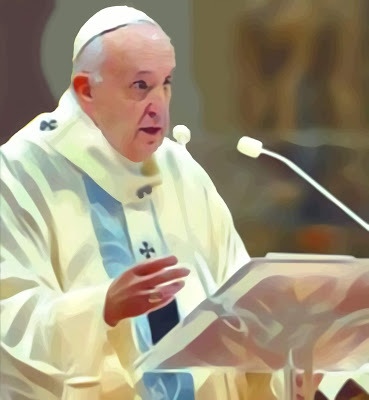 "'Christ, my hope, is risen!
"'Christ, my hope, is risen!"This is no magic formula that makes problems vanish. No, the resurrection of Christ is not that. Instead, it is the victory of love over the root of evil, a victory that does not 'by-pass' suffering and death, but passes through them, opening a path in the abyss, transforming evil into good: this is the unique hallmark of the power of God.
"The Risen Lord is also the Crucified One, not someone else. In his glorious body he bears indelible wounds: wounds that have become windows of hope. Let us turn our gaze to him that he may heal the wounds of an afflicted humanity."
~Pope Francis, Easter Message, April 12, 2020
Published on April 15, 2020 11:55



